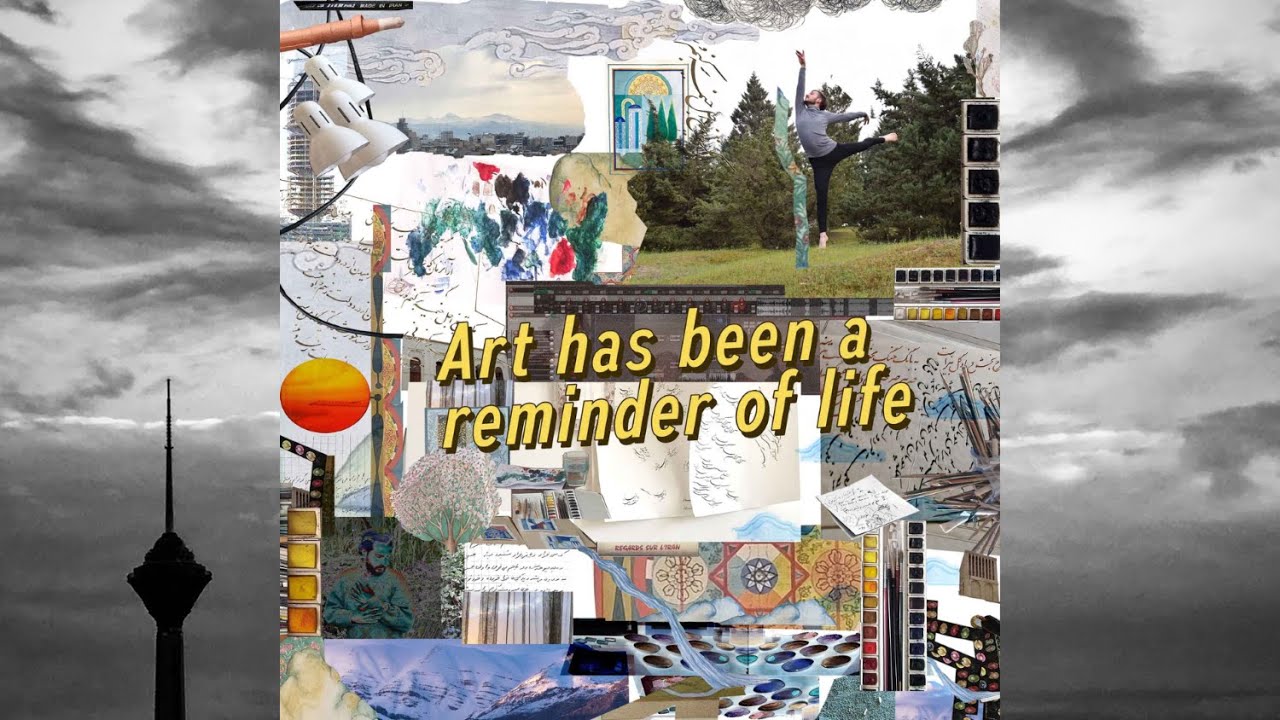“Art is a struggle against nothingness,” says Pharoos from Hormuz. TIMEZONES, the series produced by Norient, we’ve visited before. Their planned June episode on Tehran was delayed by war. Now is a perfect time to take in its threads, woven from multiple voices in a narrative that flows gently, as if in a breeze.
It gives us more into a window into Tehran, or this collective, or the sounds they collect. It dips into history and calligraphy and gesture. And then it’s also a set of reflections on how we relate to our lives and world.
It’s about a way to be human in a chaotic world. Those answers are crystal-clear, and then fold in on themselves and flip into a tender uncertainty, and back again.
The trailer:
Here’s the full half-hour episode (Bandcamp here, YouTube at bottom, or wherever you get your podcasts):
Participating members: Golnoosh Heshmati, Khorshid Parsi, Maryam Fazeli, Maryam Ramezankhani, pantea, Ramin Mahmoudi, Saghar Afzalnia
Produced by Norient
Featuring: Fatemeh, Sadra Amouei, Phaaroos, Shirine Moasser, Khamoosh
Complete list of field recordings used in the episode
Tehran: A Gateway Wandering Beyond by Khamoosh
Khamoosh is a collective that has grown organically from a monthly meeting of the Sonic Tehran network. You can read their thoughts in both Farsi and English, accompanied by exquisite fragments of presentations, schematic plans, bits of research, and photos. (I will wake up at some point in the middle of the night in a sweat, panicked about whether I should have written Persian instead of Farsi.)
They’ve traveled around the country gathering sounds, as to the village of Gouran, on Qeshm island in the south of Iran, but also for exchanges in Europe, as with Radio WORM in Rotterdam. If you are a Farsi speaker, you’ll find a CC/Open Culture virtual workshop you can share. (Some materials are also available in Kurdish.) That includes making Creative Commons licenses themselves available in Farsi and Kurdish. And they’ve extended their sound collections across the diversity of Iranian, Kurdish, and Afghan communities.
Check their website:
They come together in the shared intimacy of sound through the tools of technology and time. Hearing the relationship between sound and language is an ongoing process formed by both well-known and unknown contributors as well as by non-humans, broadening the listening sphere of their extended collective.Their combined practices include music, anthropology, linguistics, and audiovisual design.
Maryam Fazeli & Simin Stine also have this powerful music, which it seems more people need to discover — that’s you! Buy it! Get those happy squares below the album art:
bbb (swan songs for fear) by abolish i
About that duo:
The duo “abolish i” consisting of (former featuring solo acts) moraya and abji_hypersun, compose from a setup of electronics, de-tuned and distorted instruments. Layering and sampling found materials and field recordings they create channels for anger, grieving and aliveness, which births bass, noise and breaks, melting genres like d’n’b, ambient and shoegaze. Embracing chaos and the operatic.
It’s strange to see the year 2023 come up as a terminus for many projects. Political events in Iran and externally I know have hit hard; they’ve certainly derailed me in a lot of ways. But I’m aware, too, of how much I need these sounds. I hope you feel the same.
Here’s a piece from participant Maryam Ramezankhani:
راهی بزن که آهی بر سازِ آن توان زد
شعری بخوان که با او رَطلِ گران توان زد
بر آستانِ جانان گر سر توان نهادن
گلبانگِ سربلندی بر آسمان توان زد
قَدِّ خمیدهٔ ما سهلت نماید اما
بر چشمِ دشمنان تیر، از این کمان توان زد
حافظ
“Play a tune that a sigh can be set to,
Sing a verse to which a heavy cup can be raised.
If one can lay their head at the threshold of the beloved,
The triumphant song of pride can be sung to the skies.
Our bent stature may seem weak and easy, but
From this bow, an arrow can be shot into the enemy’s eye.”
Hafez
See also Rabt space, partly in Tehran and partly nomadic, as co-founded/facilitated by the collective’s own Golnoosh Heshmati.
I think that’s a real need, the kind of need that fulfills a person’s spiritual and emotional side, and you have to nourish that part of yourself.
Fatemeh
Previously, from the same series:
And I’ve joined this series as an interviewer:
TIMEZONES – Season 3 by Norient
Tags: Afghanistan, artists, collectives, electronic music, Fatemeh, inspiration, Iran, Khamoosh, Kurdish, Kurdistan, listening, Norient, Pharoos, Podcasts, sound art, Tehran
